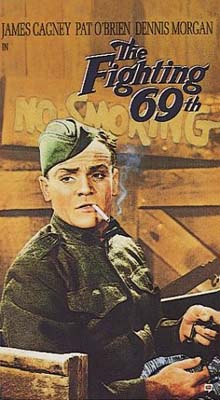The Fighting 69th
| The Fighting 69th | |
|---|---|
 VHS cover | |
| Directed by | William Keighley |
| Written by | Norman Reilly Raine Fred Niblo, Jr. Dean Riesner |
| Produced by | Louis F. Edelman Hal B. Wallis |
| Starring | James Cagney Pat O'Brien George Brent Dennis Morgan Alan Hale, Sr. |
| Cinematography | Tony Gaudio |
| Edited by | Owen Marks |
| Music by | Adolph Deutsch |
Production company | |
Release date | January 26, 1940 (US) |
Running time | 90 min. |
| Country | United States |
| Language | English |
| Box office | $1,822,000 (domestic rentals)[1] |
The Fighting 69th (1940) is an American war film starring James Cagney, Pat O'Brien, and George Brent. The plot is based upon the actual exploits of New York City's 69th Infantry Regiment during World War I. The regiment was given that nickname when opposing General Robert E. Lee during the American Civil War.
Real people portrayed in The Fighting 69th include Father Francis P. Duffy, the chaplain; battalion commander and future OSS leader "Wild Bill" Donovan; Lt. Oliver Ames, a platoon commander; and then-Sgt. Joyce Kilmer (Jeffrey Lynn), a famous poet, who was killed in battle on July 30, 1918. [2]
Most of The Fighting 69th was filmed at Warner Brothers' Calabasas Ranch location, which served as Camp Mills, the regiment's training base, various French villages, and numerous battlefields.[3]
Plot[]
The plot centers on misfit Jerry Plunkett (James Cagney), a tough-talking New Yorker who displays a mixture of bravado and cowardice. Caught up in patriotic fervor when the United States enters WWI, he proves to be a coward in battle. The chaplain, Father Francis P. Duffy (Pat O'Brien) attempts to reform Plunkett. Sgt. "Big Mike" Wynn (Alan Hale, Sr.) loses both his brothers in action due to Plunkett's blunders. Major Donovan ultimately orders Plunkett to be court-martialed. While he is awaiting execution, his jail cell is destroyed by a German shell, freeing him. He then sees Father Duffy ministering to several wounded troops, urging them to keep their faith and have courage. Shamed and inspired by Donovan's forbearance, Plunkett runs to rejoin his unit at the front. Coming across a mortar whose crew have almost all been killed, he forces the only surviving soldier, Sgt. "Big Mike" Wynn, to show him how to operate it. He then uses it to save his entire unit. Finally, he sacrifices his life to protect "Big Mike" by covering a grenade with his body.
While Jerry Plunkett was a fictional character, Father Duffy, Major Donovan, Lt. Ames, and poet Joyce Kilmer were all real members of the 69th. Many of the events depicted (training at Camp Mills, the Mud March, dugout collapse at Rouge Bouquet, crossing the Ourcq River, Victory Parade, etc.) actually happened.
Cast[]
|
|
Production[]
John T. Prout, an Irish American who was a former Captain in the regiment and a general in the Irish Army, was the movie's "technical advisor".[4][5]
Priscilla Lane was initially cast as one of the soldiers' girls back home, but the part was cut prior to production. No female characters are seen in the film.

References[]
- Notes
- ^ Warner Bros financial information in The William Shaefer Ledger. See Appendix 1, Historical Journal of Film, Radio and Television, (1995) 15:sup1, 1-31 p 20 DOI: 10.1080/01439689508604551
- ^ Werner, Stephen. "The tragedy of Joyce Kilmer, the Catholic poet killed in World War I." America, 219, No. 2 (July 27, 2018).
- ^ The Fighting 69th at TCM.com
- ^ IMDb "Full Credits"
- ^ Gevinson, Alan American Film Institute Catalog
External links[]
- English-language films
- 1940 films
- 1940s war films
- American films
- American black-and-white films
- Warner Bros. films
- Western Front (World War I) films
- Films about capital punishment
- Films directed by William Keighley
- Films scored by Adolph Deutsch
- American war films